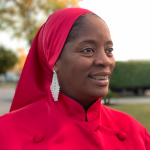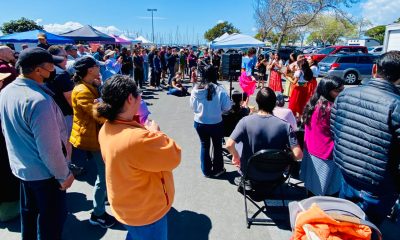Activism
How to Solve Domestic Violence: Through the Eyes of Black Men
Systemic racism, a history of racist policies, and racist social structures all contribute to Black women and Black men experiencing intimate partner violence at a disproportionately high rate, according to a 2020 study released by the National Coalition Against Domestic Violence (NCADV).

By Charlene Muhammad | Special to the Oakland Post
Black male peace advocates working to eradicate domestic violence in their communities say a key solution is providing more education and resources to those who harm their partners, children or others living in their homes.
Systemic racism, a history of racist policies, and racist social structures all contribute to Black women and Black men experiencing intimate partner violence at a disproportionately high rate, according to a 2020 study released by the National Coalition Against Domestic Violence (NCADV).
That NCADV report found that over 45 % of Black women and over 40 % of Black men have experienced intimate partner physical violence, intimate partner sexual violence or intimate partner stalking in their lifetimes.
Separation is a key to safety and survival, DV experts say, but in some cases, it is only a temporary solution. There are countless stories of women who have filed restraining orders and fled to a safe house with family or friends — sometimes even remote strangers — only to return to toxic environments, where some unfortunately have been killed.
So, advocates feel it is important to increase awareness among males and recruit male allies to become active in making a change.
“That’s one of the things that’s going to be really important in terms of addressing and curbing some of this, other men stepping up to the plate, supporting other men and holding other men accountable to stop the violence by modeling it in on their own lives and through their own behaviors,” said Edward L. Moore, an Oakland-based certified life coach and batterer’s intervention specialist at Men Creating Peace, a community-based organization.
He currently works with Oakland’s violence prevention program helping young men understand how they can avoid domestic violence and intimate partner violence.
“When men do become batters, the approach we take is more punitive,” said Moore, before clarifying that he is not suggesting there shouldn’t be consequences or men shouldn’t be held accountable.
“But the approach has been through a more judicial than social lens,” he observed. “For example, most of the men I get in support groups come through mandatory classes, which feels very punitive to them.”
According to Moore, 85 % of those seeking services are court-ordered and 15 % of them are self-referred – men who have started to feel the impact of their violence and are seeking change. Regardless of race, socio-economic status, background, upbringing, culture or religion, men from all walks of life seek their help, he pointed out.
According to Moore, facilitators do their best to hold batterers accountable, while letting them know they made a mistake that doesn’t necessarily define who they are.
“We really show them not only how to impact themselves, their children, their families, the person that they caused the violence against, but then ultimately, their community,” said Moore.
“The number one thing that gets men’s attention is when I show them how they first of all impact themselves through their violence,” he continued.
His own breakthrough came while incarcerated, during a visit with his own son, who counted the days until they were reunited, and he could freely touch his father’s hand. It also came through reflections on the love of his grandmother. She never drove a car, but had to go miles, then wait in long lines to visit him,” said Moore.
When men join his program, Moore asks them to identify everything they have lost due to their violence. Next, he has them identify what their family and children have lost. Then, he asks them to examine what the person they were violent to lost, and what did their community lose.
“It’s one of the most impactful tools that I’ve used to help men be invested in stopping their own violence,” said Moore.
The men he serves say the biggest thing they need to help make a change is education. Second, they say they need sincere advocates to help hold them accountable.
“Most of the time hurt people hurt people. I often tell the guys the things that happened to you over the course of your life are not your fault, but as an able-bodied adult, it’s your responsibility to get the healing that you need so that you don’t bleed on people that didn’t cut you,” said Moore. “You must temper accountability with compassion, and it’s a delicate dance and you must know when to do which, but both are needed,” he said.
Dr. Aquil Basheer, founder and executive director of the Professional Community Intervention Training Institute (PCITI) – a community-based organization based in Los Angeles – is a certified “violence-intersession, gang-hostility intervention training specialist.”
Basheer has conducted trainings worldwide. Black men who commit acts of domestic violence are attempting to heal themselves, he says.
“When we see traumatized people using what so many of us would consider anti-social means, they’re doing it to get well, using it to try to create some degree of wellness and restoration. Somewhere in the process, they bought into the idea that it was okay,” said Basheer.
According to Basheer, pursuing non-conventional solutions amounts to “thinking systematically.”
“If, in my perception, domestic violence is okay to me, because it creates some degree of wellness and healing for me, I’m going to continue to use it if I have no other options that can give me the same result that the domestic violence is giving me,” Basheer points out.
A key to solving domestic violence is the participation of the whole family in the treatment process, argued Basheer.
The individual cases may differ, and no cookie-cutter approach can be applied, but looking at the root causes, you can find common denominators that help you get to the bottom of the problem among Blacks, Asians, Latinos, and others, Basheer added.
“You’re looking at a perpetuating cycle, where if every individual’s needs and wants are not taken care of, you are going to continue with that broken cycle,” he said.
Activism
Oakland Post: Week of April 24 – 30, 2024
The printed Weekly Edition of the Oakland Post: Week of April 24 – 30, 2024

To enlarge your view of this issue, use the slider, magnifying glass icon or full page icon in the lower right corner of the browser window. ![]()
Activism
Oakland Post: Week of April 17 – 23, 2024
The printed Weekly Edition of the Oakland Post: Week of April 17 – 23, 2024

To enlarge your view of this issue, use the slider, magnifying glass icon or full page icon in the lower right corner of the browser window. ![]()
Activism
Oakland Schools Honor Fred Korematsu Day of Civil Liberties
Every Jan. 30, OUSD commemorates the legacy of Fred Korematsu, an Oakland native, a Castlemont High School graduate, and a national symbol of resistance, resilience, and justice. His defiant stand against racial injustice and his unwavering commitment to civil rights continue to inspire the local community and the nation. Tuesday was “Fred Korematsu Day of Civil Liberties and the Constitution” in the state of California and a growing number of states across the country.

By Post Staff
Every Jan. 30, OUSD commemorates the legacy of Fred Korematsu, an Oakland native, a Castlemont High School graduate, and a national symbol of resistance, resilience, and justice.
His defiant stand against racial injustice and his unwavering commitment to civil rights continue to inspire the local community and the nation. Tuesday was “Fred Korematsu Day of Civil Liberties and the Constitution” in the state of California and a growing number of states across the country.
One OUSD school is named in his honor: Fred T. Korematsu Discovery Academy (KDA) elementary in East Oakland.
Several years ago, founding KDA Principal Charles Wilson, in a video interview with anti-hate organization “Not In Our Town,” said, “We chose the name Fred Korematsu because we really felt like the attributes that he showed in his work are things that the children need to learn … that common people can stand up and make differences in a large number of people’s lives.”
Fred Korematsu was born in Oakland on Jan. 30, 1919. His parents ran a floral nursery business, and his upbringing in Oakland shaped his worldview. His belief in the importance of standing up for your rights and the rights of others, regardless of race or background, was the foundation for his activism against racial prejudice and for the rights of Japanese Americans during World War II.
At the start of the war, Korematsu was turned away from enlisting in the National Guard and the Coast Guard because of his race. He trained as a welder, working at the docks in Oakland, but was fired after the bombing of Pearl Harbor in 1941. Fear and prejudice led to federal Executive Order 9066, which forced more than 120,000 Japanese Americans out of their homes and neighborhoods and into remote internment camps.
The 23-year-old Korematsu resisted the order. He underwent cosmetic surgery and assumed a false identity, choosing freedom over unjust imprisonment. His later arrest and conviction sparked a legal battle that would challenge the foundation of civil liberties in America.
Korematsu’s fight culminated in the Supreme Court’s initial ruling against him in 1944. He spent years in a Utah internment camp with his family, followed by time living in Salt Lake City where he was dogged by racism.
In 1976, President Gerald Ford overturned Executive Order 9066. Seven years later, the 9th Circuit Court of Appeals in San Francisco vacated Korematsu’s conviction. He said in court, “I would like to see the government admit that they were wrong and do something about it so this will never happen again to any American citizen of any race, creed, or color.”
Korematsu’s dedication and determination established him as a national icon of civil rights and social justice. He advocated for justice with Rosa Parks. In 1998, President Bill Clinton gave him the Presidential Medal of Freedom saying, “In the long history of our country’s constant search for justice, some names of ordinary citizens stand for millions of souls … To that distinguished list, today we add the name of Fred Korematsu.”
After Sept. 11, 2001, Korematsu spoke out against hatred and discrimination, saying what happened to Japanese Americans should not happen to people of Middle Eastern descent.
Korematsu’s roots in Oakland and his education in OUSD are a source of great pride for the city, according to the school district. His most famous quote, which is on the Korematsu elementary school mural, is as relevant now as ever, “If you have the feeling that something is wrong, don’t be afraid to speak up.”
-

 Activism4 weeks ago
Activism4 weeks agoOakland Post: Week of March 27 – April 2, 2024
-

 #NNPA BlackPress4 weeks ago
#NNPA BlackPress4 weeks agoBeloved Actor and Activist Louis Cameron Gossett Jr. Dies at 87
-

 Community1 week ago
Community1 week agoFinancial Assistance Bill for Descendants of Enslaved Persons to Help Them Purchase, Own, or Maintain a Home
-

 Activism3 weeks ago
Activism3 weeks agoOakland Post: Week of April 3 – 6, 2024
-

 Business2 weeks ago
Business2 weeks agoV.P. Kamala Harris: Americans With Criminal Records Will Soon Be Eligible for SBA Loans
-

 Activism2 weeks ago
Activism2 weeks agoOakland Post: Week of April 10 – 16, 2024
-

 Community2 weeks ago
Community2 weeks agoAG Bonta Says Oakland School Leaders Should Comply with State Laws to Avoid ‘Disparate Harm’ When Closing or Merging Schools
-

 Community7 days ago
Community7 days agoOakland WNBA Player to be Inducted Into Hall of Fame






















































